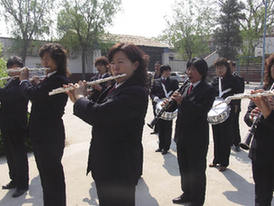
On the square before the Dahanji Village Committee building, Gao Jianyin and his band are playing In the Field of Hope, surrounded by a few hundred cheering villagers. Loud applause makes Gao feel great excitement and a sense of success – his long-held dream of organizing a band has finally come true.
At the end of 2007, Gao’s band of 40 was established in Dahanji, a village on the southwest tip of Beijing. As the initiator and coach, Gao carefully selected every member from the 2,500 locals. Some of his relatives knocked on his door and wanted to join, but he turned them down. “I want a band whose members have some musical knowledge and are keen to learn,” he says emphatically.
Pei Chunyu is an example of the kind of player Gao needs. Pei played bamboo flute in the 1970s to accompany “model dramas,” modern plays with revolutionary themes popular during the “cultural revolution” (1966-76). The fact is, most of the band members have little experience playing an instrument, let alone performing. Gao has them practice every weekend, but is not satisfied with their progress. “When I studied instruments in the army,” he says of his youth some 40 years ago, “we soldiers had to practice under the baking sun for hours every day, studying how to read music and play every kind of instrument.”
After serving in the army for four years, Gao was demobilized in 1974. He went back to Dahanji and soon got married. The veteran couldn’t stand living without music, and tried to teach his four children, including twin daughters, to play musical instruments. “They showed little interest,” he recalls ruefully. “Probably I took it too seriously and the kids couldn’t understand.”
The members of Gao’s current band see playing more as fun or entertainment, although they respect their coach’s serious approach. About half of the musicians are farmers, while the rest work in factories run by the village. Traditionally evenings in Dahanji are dedicated to mahjong, but Pei for one thinks this game has dominated village entertainment for too long. “As you can imagine, it’s boring to play mahjong year after year.” The village committee welcomes the new evening diversion. It provided about RMB 30,000 as a start-up fund and a few practice rooms. Some band members have also contributed financially. Local tailor Sha Shuangxue, dubbed the “king of trousers” by villagers, provided the band’s performance suits.
In Dahanji, the annual income per capita is RMB 8,000. “Life has become much easier now,” Pei beams, “and we don’t have to struggle for an apartment like those in the towns.” Pei is in his 60s, but still works as secretary of the village Party committee. Medical expenses were once his major headache, but it is no longer a problem since the villagers have joined a program called the Rural Cooperative Medical Service. Residents pay only RMB 80 per year (less than US $12) and can get around 70 percent of their medical expenses reimbursed.
“I am calling my band!” Gao shouts on the village square. Every weekend he waits here for his fellow players, but apart from performances it is rare for all 40 members to show up at the same time. Gao gets annoyed but tries to find a balance. “Be happy!” his wife says from the kitchen, where she spends most of her days. She knows how dedicated her husband is, and believes he can find joy in the process of realizing his dream.
